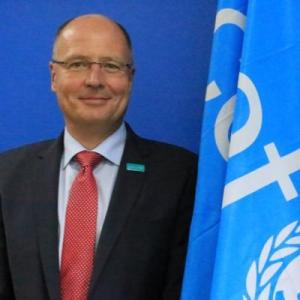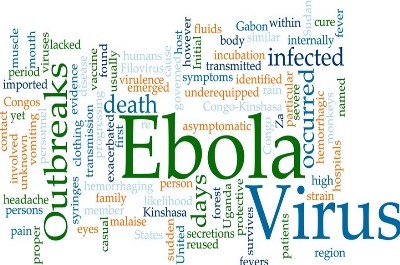UNICEF to double staff in Ebola-affected countries; UN health chief deplores lagging vaccine research
3 November 2014 – As the United Nations Children’s Fund (UNICEF) announced today that it plans to boost its staff in countries on the frontlines of the Ebola outbreak in West Africa, the head of the UN World Organization today attributed the lack of research into cures and vaccines for Ebola on the fact that the disease has historically been confined to poor African nations.
“A profit-driven industry does not invest in products for markets that cannot pay,” Dr. Margaret Chan, WHO Director-General said in Cotonou, Benin, in her address to the Regional Committee for Africa.
At UN Headquarters, Dr. Peter Salama, Global Ebola Emergency Coordinator for UNICEF, told reporters that the agency will be doubling its staff from 300 to 600 in the three most-affected countries – Guinea, Liberia and Sierra Leone ¬– where children account for one-fifth of all Ebola cases.
Dr. Salama also said an estimated 5 million children are affected and some 4,000 children have become orphaned from the current epidemic.
He described as “terrifying” the epidemic as seen from the eyes of the millions of children in the three most affected countries where “death is all around them.”
“Schools are closed, children are confined to their homes and discouraged to play with other children,” he said.
In addition to those orphaned, the UNICEF doctor said “many more are sent away for their own protection” and are confined to “quarantine centres not knowing whether their parents are alive or dead.”
UNICEF, he said, is reaching out to Ebola survivors who are often willing to work on the frontlines of the disease response at the community level in local care centres with community health workers.
The Head of the UN Mission for Ebola Emergency Response (UNMEER), Anthony Banbury, meanwhile, travelled to Sierra Leone today after visiting Guinea over the weekend. In both countries, he visited Ebola treatment centres in remote areas to see first-hand how the Mission can fill the gaps in the response.
In Sierra Leone, he met with Ebola survivors in Kenema and visited a Logistics Base, run by the World Food Programme in the Port Loko district. He also visited the newly-opened Command and Control Centre, which is in charge of coordinating burials and ambulance pick-ups.
Mr. Banbury will also travel to Liberia before he briefs the Security Council next Monday.
In Cotonou, the WHO Executive Director said that in the midst of the Ebola outbreak ravaging parts of West Africa in the most severe acute public health emergency seen in modern times, “two WHO arguments that have fallen on deaf ears for decades are now out there with consequences that all the world can see, every day, on prime-time TV news,” Dr Chan said.
“The first argument concerns the urgent need to strengthen long-neglected health systems,” she said.
“Without fundamental public health infrastructures in place, no country is stable. No society is secure,” she said. “No resilience exists to withstand the shocks that our 21st century societies are delivering with ever-greater frequency and force, whether from a changing climate or a runaway killer virus.”
The second argument, the WHO Director-General said, is that despite the fact that Ebola emerged nearly four decades ago: “Why are clinicians still empty-handed, with no vaccines and no cure?”
“Because Ebola has historically been confined to poor African nations,” she said. “The R&D [research and development] incentive is virtually non-existent. A profit-driven industry does not invest in products for markets that cannot pay. WHO has been trying to make this issue visible for ages. Now people can see for themselves.”
WHO also reported today that Senegal’s recent stamping out of Ebola was achieved not only through its rapid infectious disease control work, but also by using a novel SMS-driven platform originally designed to help people manage diabetes.
As part of a massive public awareness effort, Senegal’s Ministry of Health sent 4 million text messages to the general public warning of the dangers of Ebola and how to prevent it such as: wash your hands with soap and water regularly; avoid all contact with people who are sick with or have died from Ebola; and do not touch or eat the meat of dead or sick animals (monkey, rat, warthog, porcupine, pork).
Stay with Sierra Express Media, for your trusted place in news!
© 2014, https:. All rights reserved.





